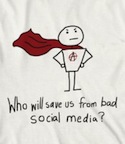If there’s one thing I hate about Facebook’s Like is that it limits the language you interact. It’s a marketer’s dream in that only positive feedback is displayed, but what about for the rest of us? What if we hate a product, or a particular company is horrible? Do we have to like them before we can write on their wall, and if we like them isn’t that hypocritical? And what if you actually, really love a certain product?
“Like” reminds me of Newspeak from George Orwell’s 1984. Newspeak is the attempt of the fictional government to limit what people think and do by limiting the language they used. If you don’t have the language to communicate an idea it becomes much harder to express it.
With that in mind, why can we only like things? There are certain things I love, like kittens, locopops, and strawberry smoothies. I want people to know that these things are more awesome than things I simply like. Is that so wrong Facebook? Can’t I give more value to the brands and things I really, truly love?
While it would be nice to love some things, I also need to dislike things. I don’t want to dislike all my friend’s awkward status updates. They can learn the hard way. I want people to know what things I think are scams, evil, or just dumb. It’s time for there to be a negative option to how people interact with businesses on Facebook so businesses can learn what they are doing wrong.
What value exists for this in Facebook? Well, Facebook is already selling all of my data and making it available for anyone with half a brain. If users added nuances and more data to their profiles of the things they love, like, and dislike, think of how useful it would be for marketers and businesses buying Facebook ads. Not only would marketers be able to target based on what we like, but also what is driving us nuts and has us begging for more.
This also helps solve the problem of what sentiment people are using online. A sarcastic person such as myself can’t throw off the results as easily if I am a known dislike. And the Love feature shows who your brand advocates will be.
These options are still limiting like Newspeak, but they expand away from the mindless universal like. Isn’t it time to move beyond liking?










